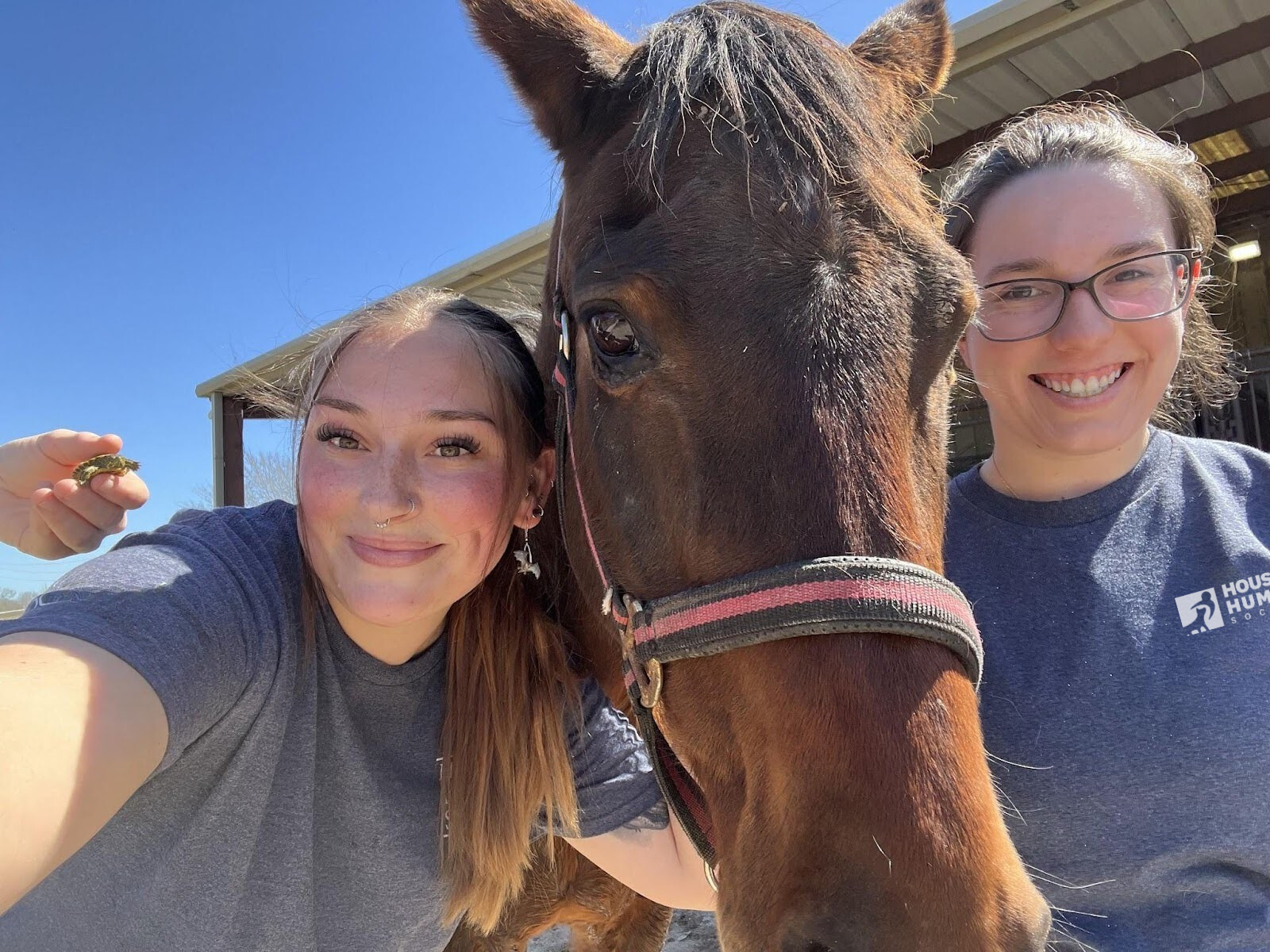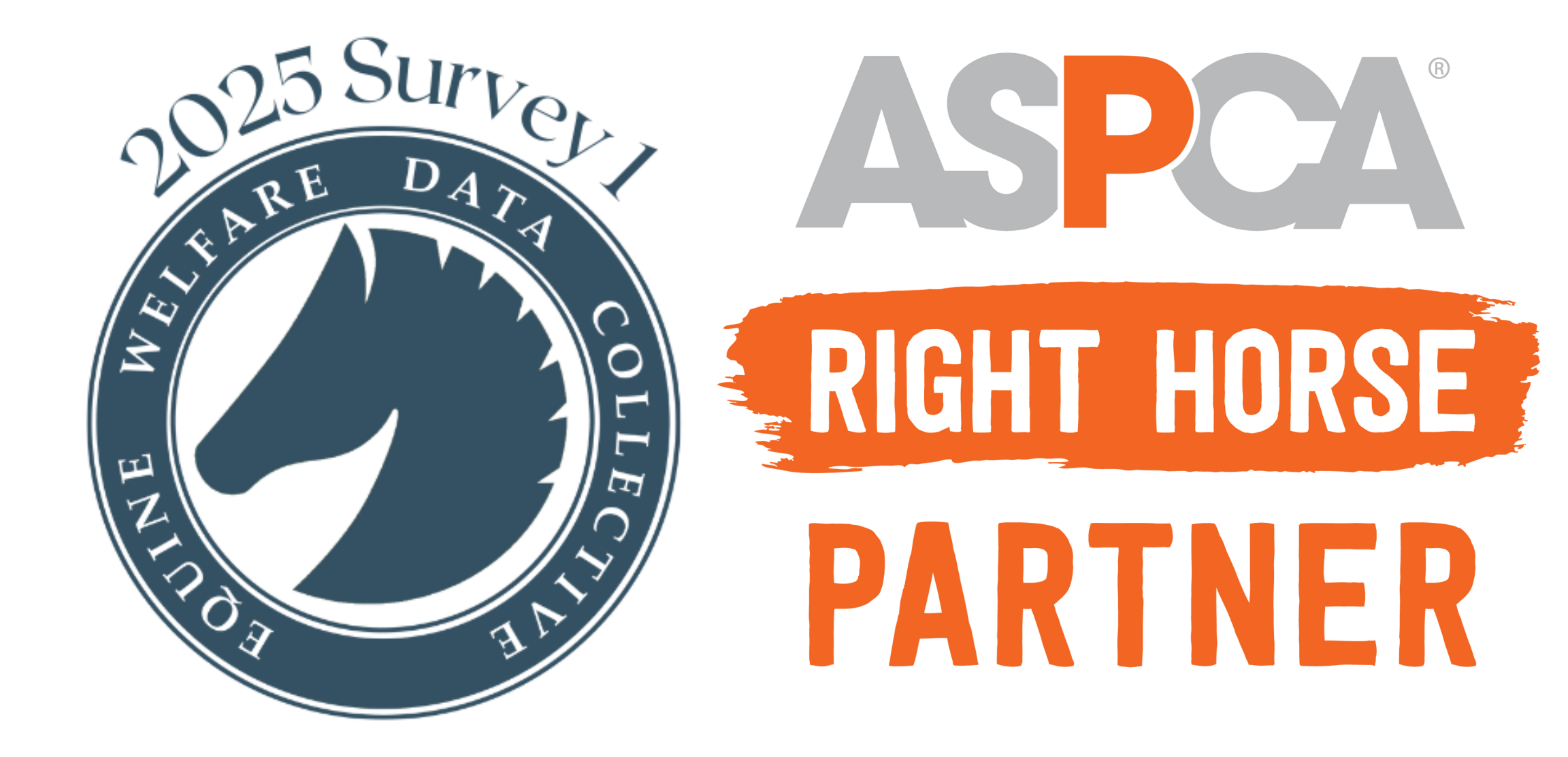GIVE A SECOND CHANCE TO A HORSE IN NEED

The Houston Humane Society is dedicated to rescuing, rehabilitating, and finding forever homes for horses in need.
About our Equine Program:
At the Houston Humane Society, our equine program works to save abused, neglected, and abandoned horses. We offer them medical care, rehabilitation, and a safe environment where they can heal and thrive. We receive calls from law enforcement and animal control officers about horses in danger. Each case is carefully assessed, and we provide the necessary medical and emotional care. Once in our care, each horse receives a thorough medical exam and treatment. We focus on both physical healing and mental rehabilitation, often involving specialized training to re-socialize abused or fearful horses. When each horse is ready to find new homes, we partner with ASPCA Right Horse and Bluebonnet Equine Humane Society to help place each animal into the perfect forever home.
Ways to get involved:
Donate: Donate your items collecting dust! Old but still usable buckets, tack, grooming supplies, muck tubs, and more. New fencing supplies and pasture management supplies are always needed. Equine businesses can always donate services for events or for the horses in our care.
Volunteer: Need some horse time but can't commit full-time to having your own? Come groom, take pictures, do barn chores, and learn more about the equine industry.
Sponsor a Horse: Can't donate time? Consider sponsoring a horse for a month. Sponsoring would cover feed/hay costs, farrier costs, and any medical treatment they need.
Adopt a Horse: Looking for your next companion? Check out our adoptable horses and reach out to our team! After applying and talking to one of our dedicated team members to help make the best match, you’ll be invited out to meet our adoptables. Out of state? That's ok! We can do Zoom meet and greets, and through the ASPCA, we can assist with hauling that new friend to your home!
Are you concerned about an animal in your area?
If you have any concerns about immediate welfare issues, please contact your local sheriff's office or the Harris County Animal Cruelty Task Force if you reside in the Houston area.
When to be concerned:
Lameness or Difficulty Moving: If a horse is limping, unwilling to walk, or displaying any signs of pain while moving, it could indicate injury or illness.
Weight Loss: Sudden or significant weight loss, regardless of diet, can signal health issues like dental problems, parasites, or metabolic disorders.
Lethargy or Lack of Appetite: If a horse becomes lethargic or refuses food and water, this could be a sign of an underlying illness or discomfort.
Bleeding or Wounds: Visible cuts, abrasions, or swelling that doesn’t improve over time or seems infected (redness, heat, pus) should be treated by a veterinarian.
Inadequate Shelter: Horses need protection from extreme weather conditions. Insufficient shelter, especially in freezing or excessively hot conditions, can be harmful to their health.
Poor or Contaminated Feed: If a horse's food or water supply is spoiled, contaminated, or otherwise inadequate, it can lead to malnutrition, dehydration, and illness.
Unsafe Living Conditions: Fencing should be safe and secure. Sharp objects, poorly maintained barns or pastures, and dangerous environmental factors can pose serious threats to a horse's safety.
How else do we serve the community?
Need to Surrender a Horse: If you are struggling to keep your beloved family member, please reach out to admissions@houstonhumane.org or info@bluebonnetequine.org
Feed and Hay Assistance: We’re here to help ensure no horse goes hungry. Our Feed and Hay Assistance Program provides support to horse owners facing temporary financial hardship. Whether you're struggling to make ends meet due to unexpected circumstances or recovering from a crisis, we offer short-term aid with essential feed and hay supplies to keep your horses healthy and well-nourished. Our goal is to support responsible ownership and help horses stay in loving homes. More info can be found here.
We're now offering a Public Horse Clinic at Houston Humane Society!
Vaccines, Coggins testing, and microchips are available on select November dates.
This month only: Get our "Ride Ready" package for just $140 - a 25% savings!
Package includes:
• Prestige 5 vaccine
• Rabies vaccine
• Coggins testing
• Waived office visit fee
• Microchip available for $10 with Ride Ready purchase
📅 November 22, 2025
🕘 9:00 AM – 12:00 PM
📍 14700 Almeda Rd., Houston, TX 77053
Appointment required. To book an appointment, call/text 713-433-6421 or book online.
Last Act of Kindness (Euthanasia) and Disposal: Compassionate end-of-life care is an essential part of responsible horse ownership. Ensuring that euthanasia and proper disposal options are both accessible and affordable helps prevent unnecessary suffering and neglect. Many horse owners face emotional and financial challenges during this difficult time, and having reliable, humane options available within their means ensures that every horse can receive a respectful and dignified farewell.
At the heart of equine welfare is the belief that no horse should suffer due to barriers in cost or availability of care. Expanding awareness, resources, and support for affordable euthanasia and disposal services helps protect horses, support owners, and uphold the values of compassion and responsibility that define true animal stewardship.
UC Davis has a page dedicated to assisting owners through the euthanasia process, which can be found HERE.
Please reach out to us with any questions about scheduling a euthanasia or a disposal appointment. We offer disposal pick-up services through a contracted provider.
Castration Assistance: Castration, or gelding, is a crucial procedure for responsible horse management. It helps reduce unwanted breeding, manage behavior, and improve the overall health and safety of horses.
We aim to host community castration events to raise awareness about the importance of this procedure, how it benefits individual horses and herds, and how owners can access safe and affordable services. These events provide educational resources, connect owners with experienced veterinarians, and promote responsible equine care throughout the community.
Other Animals: We take in and support all animals, including chickens, pigs, sheep, and goats. Our commitment extends beyond horses to ensure that all animals in need receive the care, shelter, and compassion they deserve. Whether it’s providing a safe haven, feed assistance, or medical support, we’re here to help every animal live a healthy and dignified life.
Chickens: We currently have several chickens available for adoption at $10 per chicken. Fill out this form for more information.
Coming soon:
Dental Clinics
Educational events
Don’t see a good match? Fill out our interest form here.
Equine Adoption FAQ (Frequently Asked Questions)
Helping you prepare for a successful, lifelong partnership with your new horse.
1. What types of horses are available for adoption?
Our adoptable horses vary in age, breed, training level, and background. Some are rideable and ready for new adventures, while others are best suited for companionship or light work due to age or health conditions. We work hard to match each adopter with a horse that fits their experience, goals, and resources.
2. What is included in the adoption fee?
Adoption fees help offset the cost of care, veterinary treatment, and training. Most horses are up-to-date on vaccinations, deworming, dental care, and farrier work. They also come with a current health record and microchip for identification.
3. What should I expect during the adoption process?
▪️ Application: Submit an adoption application so we can learn about your experience and facility.
▪️ Review: Our team will review your application and contact you with questions.
▪️ Meet & Greet: You’ll visit to meet suitable horses and interact with them under supervision.
▪️ Home Check: We may perform a facility visit or request photos to ensure a safe environment.
▪️ Adoption Agreement: Once approved, you’ll sign an agreement outlining care standards and return policies.
4. Do you offer trial periods?
Currently, we do not offer trial periods or fostering opportunities. Our goal is to ensure each animal is placed in a permanent, committed home where they can begin their new life with stability and care. We encourage all adopters to carefully consider their decision and reach out with any questions before adoption to ensure the best possible match.
5. What kind of facility or shelter do I need?
We require that horses have:
▪️ Safe, secure fencing (no barbed wire)
▪️ Adequate shelter from wind, rain, and sun
▪️ Access to clean water and quality forage at all times
▪️ Sufficient space to move freely and interact with other horses (if applicable)
We understand that every setup is different; our goal is to ensure your facility meets the horse’s welfare needs.
6. Can I board my adopted horse instead of keeping them at home?
Yes! Boarding is a great option if you don’t have your own property. Please provide the boarding stable’s name, contact info, and photos of the facility during your application. We may contact the barn manager as part of the approval process.
7. What happens if the adoption doesn’t work out?
Our goal is lifelong placements, but we understand that situations can change. All horses adopted from us must be returned to our care if you can no longer keep them. We will never judge or penalize adopters for doing what’s best for the horse.
8. Are the horses rideable?
Some are, and some aren’t. Each horse’s profile lists its training level and any physical limitations. We’ll be honest about what each horse can and cannot do to help ensure a safe and successful match.
9. Can I adopt if I’m new to horses?
Absolutely, but we may recommend a companion horse or one with an easygoing temperament. We can also connect you with trainers, farriers, and veterinarians to help you build confidence and skills.
10. Can I adopt more than one horse?
Yes, especially if you’re looking for companions or pasture buddies. Horses are herd animals and often do best with equine friends. However, we may limit multi-horse adoptions based on your facility’s size and resources.
11. What costs should I expect after adoption?
Ongoing care costs can include:
▪️ Feed and hay
▪️ Farrier visits every 6–8 weeks
▪️ Veterinary care (annual vaccinations, dental exams, emergency care)
▪️ Training and equipment
We’re happy to provide you with an average cost estimate during your adoption consultation.
12. Do you provide post-adoption support?
Yes! We stay connected after adoption and offer ongoing advice and check-ins. Whether you have a question about feeding, training, or behavior, our staff is always happy to help.
13. How long does it take a horse to adjust to a new home?
Every horse is different. Most take a few weeks to a few months to fully settle. Keep routines consistent, provide calm companionship, and allow plenty of time for trust-building. Remember: patience is key during this transition.
14. Can I train or compete with my adopted horse?
Yes, if the horse is physically and mentally ready. We encourage adopters to pursue light riding, groundwork, or showing when appropriate. Please work with a professional trainer if you’re introducing a new discipline or handling challenges.
15. What if my adopted horse becomes ill or injured?
You are responsible for routine and emergency care once the adoption is complete. However, we can offer referrals and guidance to help you navigate treatment or management options. In severe hardship cases, contact us to discuss support resources.
16. Can I breed my adopted horse?
No. All horses adopted from the Houston Humane Society are placed under a no-breeding policy. This ensures the welfare of both the adopted horse and the broader equine community.

